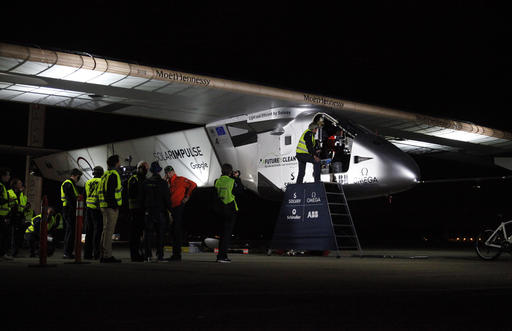Solar-powered plane’s latest leg: Ohio to Pennsylvania

Pilot Andre Borschberg sits in the cockpit of the Solar Impulse 2, as his son, Teo Borschberg, prepares the solar powered plane at Moffett Field in Mountain View, Calif., before dawn Monday, May 2, 2016. AP
DAYTON, Ohio — A solar-powered airplane has taken off from the Ohio hometown of America aviation pioneers Wilbur and Orville Wright on the latest leg of its journey around the world.
The Swiss-made Solar Impulse 2 took off from Dayton International Airport just after 4 a.m. Wednesday with a destination of Lehigh Valley International Airport in Allentown, Pennsylvania. The flight was expected to take about 17 hours.
The aircraft’s most recent journey came last weekend, when it traveled from Tulsa International Airport to Dayton. The plane’s departure from Dayton was delayed from Monday as project officials checked for possible damage after fans that keep the mobile hangar inflated had a power failure.
The plane was expected to make at least one more stop in the United States — in New York — before crossing the Atlantic Ocean to Europe or northern Africa.
The globe-circling voyage began in March 2015 from Abu Dhabi, the capital of the United Arab Emirates, and made stops in Oman, Myanmar, China and Japan.
The Solar Impulse 2’s wings, which stretch wider than those of a Boeing 747, are equipped with 17,000 solar cells that power propellers and charge batteries. The plane runs on stored energy at night.
Ideal flight speed is about 28 mph, although that can double during the day when the sun’s rays are strongest.
The plane had a five-day trip from Japan to Hawaii The crew was forced to stay in Oahu, Hawaii, for nine months after the plane’s battery system sustained heat damage on its trip from Japan.
Solar Impulse 2 then had a three-day trip from Hawaii to California’s Silicon Valley. Since then, it has made trips from northern California to Phoenix, Arizona, then on to Tulsa, Oklahoma, before heading to Ohio.
Project officials say the layovers give the two Swiss pilots — Bertrand Piccard and Andre Borschberg — a chance to swap places and engage with local communities along the way so they can explain the project, which is estimated to cost more than $100 million.
The solar project began in 2002 to highlight the importance of renewable energy and the spirit of innovation. TVJ